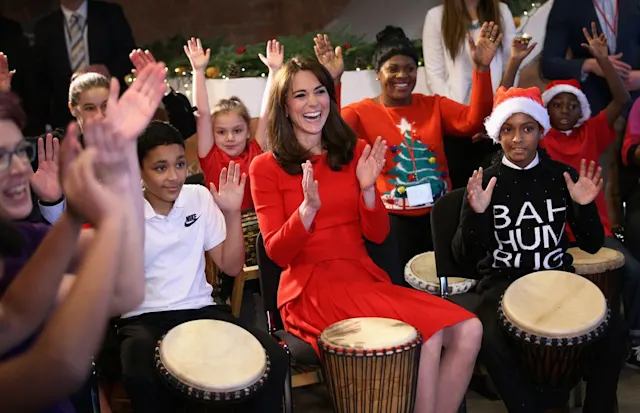The Princess of Wales is a “joy to work with” and a “brilliant interpersonal person,” according to one of her advisers at her Royal Foundation Centre for Early Childhood.
Professor Peter Fonagy, who is Chief Executive of Anna Freud, and is also on the advisory committee at the Centre for Early Childhood said: “It’s a joy working with her. I have to say, I don’t know anyone who doesn’t enjoy working with her.”
The Princess, 41, is very observant, as detailed in one of the professor’s fondest memories of working with the royal so far.
Describing an interaction at an engagement, he said: “She was at a table with the children having a good time, when one kid asked her ‘What team do you support?’ I saw her, kind of seeing whether she was going to answer or not. She then said ‘Chelsea,’ and I’m not sure if it was true or not, but it was the absolute right thing to say to this kid. And then I noticed that the kid had Chelsea colours on.”
Professor Fonagy went on to say how engaged the Princess is with everyone she meets during her public visits.
“She’s just a brilliant interpersonal person – if she was a clinical psychologist, you would want to go to her to have therapy because you would feel that if she was interested in you, she was really interested in you and that her mind wasn’t on something else.
“And as a researcher, I would say her real talent is creativity. She’s very imaginative. I think she brings that from her previous training.”
Kate unveiled the Shaping Us campaign in January to highlight the importance of supporting young children and those caring for them, with an emphasis on mental health.
The project described as her “life’s work” has been in the pipeline for a number of years.
Kate first visited Anna Freud in 2015, becoming the charity’s patron in early 2016. That year, the mother-of-three, along with Prince William and Prince Harry, spearheaded the Heads Together campaign, led by The Royal Foundation in partnership with Anna Freud.
Professor Fonagy said: “My feeling was, of the principals that were involved at the time, she was the one who understood mental health.
“She actually got it, and the 0 to 5 [age] interest, and supporting early parenting interest, obviously, is as important as promoting children’s mental health as anything could be in terms of promoting prevention.
“So, I think it’s an area where her interest in mental health and mental health promotion, and early childhood, came together.
“I think part of her ambition of making better societies is also to make a better society for wellbeing. In other words, to prevent mentally ill health.”
Earlier this year, the Princess met with a group of eight experts from across academia, science, and the early years sector to provide support and advice for her work at the Royal Foundation Centre for Early Childhood – including Professor Fonagy.
“It’s intriguing to me, she comes up with new ideas and different ways of doing things and highlighting important aspects of child development that she reads about, she hears about, she observes, and she wants to engage with and promote,” he said.
“So, she’s very interested, for example, in how different cultures bring up their children differently, and yet, equally effectively. And she has, I think, the position to promote the plurality of childcare, and not just one size fits all. She has a table of experts around her and she is able to listen to them as well.”

